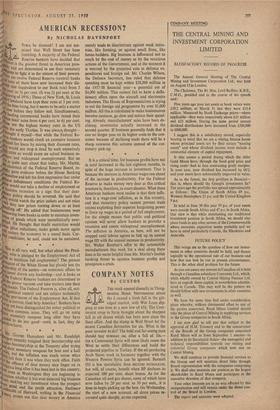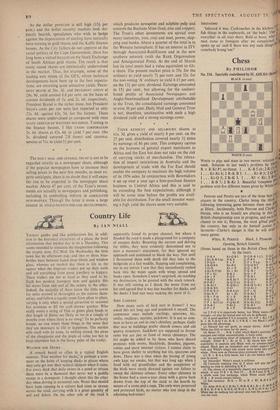COMPANY NOTES
By CUSTOS THE week opened dismally in Throg- morton Street. Nervousness about the £ caused a fresh fall in the gilt- edged market, with War Loan dip- ping at one time to a new low of 65.-1. The Com- munist coup in Syria brought about the sharpest fall in oil shares which has been seen since the Suez affair. And the slump in Wall Street hit the recent Canadian favourites for six. What is the poor investor to do? The bold and far-seeing man should buy BURMAH OIL after a fall of 10s.— for a Communist Syria will most likely cause the West to settle their differences and build the projected pipeline to Turkey. If the oil-producing Arab States work in harmony together with the Western Powers Syria can be ignored. Burmah Oil is less speculative than BRITISH PETROLEUM, but will, of course, benefit when BP declares its expected 100 per cent. share bonus. As for the Canadian oil and gas shares, some of which have now fallen by 20 per cent. to 30 per cent., it is time to begin picking up the best. On Wednesday, the start of a new account, oil share prices re- covered quite sharply, as one expected. As the dollar premium is still high (154 per cent.) and the dollar security markets look dis- tinctly bearish, speculators who wish to hedge against the depreciation of sterling have naturally been turning to gold shares and the Kaffir finance houses. As the City fathers do not approve of the racial politics of the Cape Government, there has long been a virtual boycott on the Stock Exchange of South African gold shares. The result is that many sound shares are intrinsically undervalued in the market. Thus, for example, some of the leading new mines of the OFS, whose technical developments have been up to the best expecta- tions, are returning quite attractive yields. PRESI- DENT BRAND at 56s. 3d. and PRESIDENT STEYN at 28s. 9d. yield around 8.8 per cent. on the basis of current dividends of 5s. and 2s. 6d. respectively. President Brand is the richer mine, but President Steyn's costs per ton were last reported at only 52s. 4d. against 65s. 5d. for the former. These shares seem undervalued as compared with FREE STATE GEDULD or WESTERN HOLDINGS. Turning to the finance houses, I like UNION CORPORATION 2s. 6d. shares at 42s. 6d. to yield 7 per cent. (the 3s. dividend covered 2.8 times) and GENERAL MINING at 71s. to yield 54 per cent.
The DAILY MAIL AND GENERAL TRUST is not to be regarded strictly as a newspaper share, although if the popular newspapers have to increase their selling prices in the next few months, as most ex- perts anticipate, there is no doubt that it will enjoy the rise to be expected in the newspaper share market. About 47 per cent. of the Trust's invest- ments are actually in newspapers and publishing, including its controlling interest in ASSOCIATED NEWSPAPERS. Through the latter it owns a large interest in ANGLO-NEWFOUNDLAND DEVELOPMENT,
which produces newsprint and sulphite pulp and controls the Buchans Mine (lead, zinc and copper). The Trust's other investments are spread over many industries, iron, coal and steel, power, ship- ping and banks. About a quarter of the total is in the Western hemisphere. It has an interest in ITV through Associated-Rediffusion and in the new southern network (with the Rank Organisation and Amalgamated Press). At the end of March last its total assets had a value equivalent to 63s. a share. The present market price is 35s. for the ordinary to yield nearly 74 per cent. and 32s. for the non-voting `A' ordinary to yield 8.15 per cent. on the 134 per cent. dividend. Earnings amounted to 154 per cent., but allowing for the undistri‘ buted profits of Associated Newspapers and Anglo-Newfoundland Development attributable to the Trust, the consolidated earnings amounted to over 30 per cent. Daily Mail and General Trust is not, therefore, unattractive with such a high dividend yield and a strong earnings cover.
* * * TOZER KEMSLEY AND MILLBOURN shares at 61s. 3d. gives a yield of nearly 8 per cent. on the 25 per cent. distribution covered nearly 34 times by earnings of 86 per cent. This company carries on the business of general export merchants to Africa and the East but does not take on the risk of carrying stocks of merchandise. The relaxa- tion of import restrictions in Australia and the development of trade with the Far East should enable the company to maintain the high volume of its 1956 sales. In conjunction with Bowmakers it set up over a year ago a hire-purchase finance business in Central Africa and this is said to be exceeding the best expectations, although it will be some time before the profits are avail- able for distribution. For the small investor want- ing a high yield the shares seem very suitable.































 Previous page
Previous page